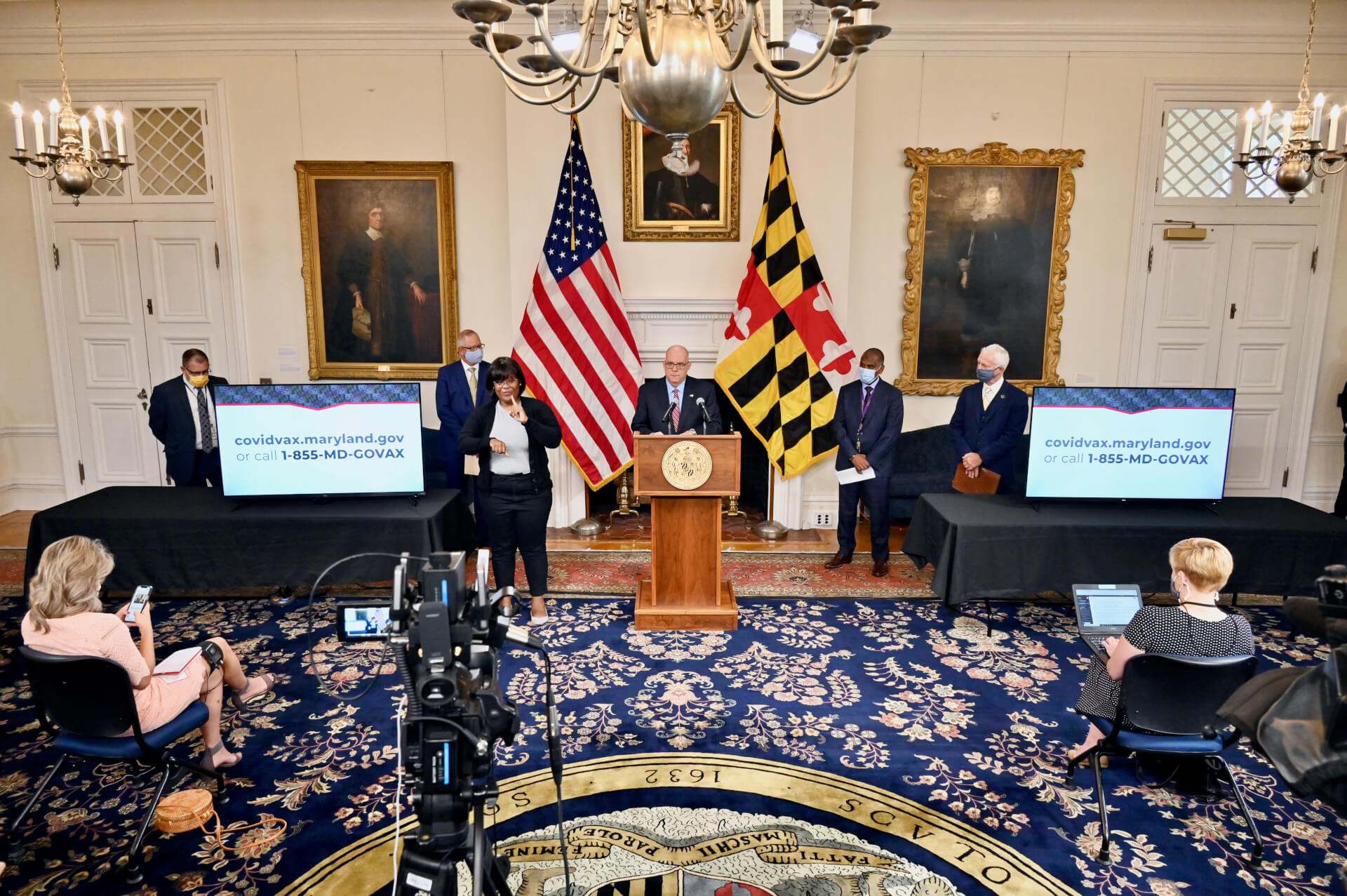Hogan, Biden Target Vaccination Rates at Nursing Homes with New Policies

Frustrated by the slow pace of employee vaccinations at some Maryland nursing homes and a small number of hospitals, Gov. Lawrence J. Hogan Jr. (R) announced on Wednesday that workers will soon be required to show proof of protection from COVID-19 or undergo weekly testing.
An executive order that Hogan signed will take effect on Sept. 1 and will apply to all 227 of Maryland’s nursing homes.
“We are concerned that the delta variant surge has led to an increase in infections among staff at nursing homes, which has been a consistent source of outbreaks,” the governor said.
Hogan also said the state will be “redoubling our enforcement actions” for nursing homes that do not comply or which “persistently fail to report their vaccination data.”
The state is doubling fines and increasing civil penalties for recalcitrant operators, the governor said.
While 79% of all nursing home staff have been vaccinated — and 18 facilities are at 95% or higher — others have lagged significantly.
For weeks leading up to Hogan’s announcement, the state health department has issued lists of the “Top 10” and “Bottom 10” skilled nursing home facilities as ranked by staff vaccination rates.
On Monday, the lowest-scoring facility on the state’s list, Oakwood Care Center in Middle River, reported that just 40% of its staff had been vaccinated. The tenth-worst nursing home had a vaccination rate of 59%. More than two dozen failed to report data, according to health officials.
Hogan called the failure to get staff vaccinated “unacceptable.” He accused unvaccinated workers of “endangering the lives of nursing home residents.”
The governor’s order also requires all staff in all Maryland hospitals to receive their first dose of a COVID-19 vaccine by September 1 or face mandatory testing.
In a statement, Bob Atlas, the head of the Maryland Hospital Association, noted that Hogan’s order would apply only to five percent of state’s medical workforce.
“On June 7, two and a half months before the Governor’s mandate, Maryland hospitals took this step to ensure the safety of their patients, employees and communities,” he said.
“Hospitals that employ approximately 95% of hospital workers in the state already have instituted a mandate or stated an intention to require COVID-19 vaccination for all employees and clinical team members.”
Hogan acknowledged that the University of Maryland Medical System, Johns Hopkins Medicine, MedStar, and GBMC Healthcare have already “led by example.”
“But not every hospital has taken action and some continue to have far too many unvaccinated health care workers, needlessly exposing their vulnerable patients… to COVID-19 and the delta variant,” he added.
Joseph DeMattos, Jr., head of the Health Facilities Association of Maryland, praised the governor for his action, saying, “your announcement today will save lives.”
DeMattos said the state faces “several challenging weeks” battling a delta variant surge “that promises to be extremely challenging.”
As Hogan continues to flirt with a potential presidential bid in 2024, he stepped up his criticism of the White House on Wednesday, calling on the Biden administration to immediately make booster shots available for seniors and and people with compromised immune systems, seek full FDA approval of vaccines, and “expedite” approval of vaccines for children age 5-11.
Biden announces federal efforts
Just after Hogan’s press conference on Wednesday, President Biden announced at a White House press conference that nursing homes will be required to ensure staffers are vaccinated against COVID-19, or risk losing federal Medicare and Medicaid dollars.
Under the new nursing home policy, the U.S. Department of Health and Human Services will develop regulations to require vaccinations of nursing home staffers as a condition of participating in Medicare and Medicaid programs.
“I’m using the power of the federal government as a payer of health care costs to ensure we reduce those risks for our most vulnerable seniors,” Biden said during the news conference detailing new federal actions.
“If you visit, live or work in a nursing home, you should not be at a high risk of contracting COVID from unvaccinated employees,” Biden added.
The new federal mandate is the latest vaccine requirement from the Biden administration. The Department of Veterans Affairs has required health care workers to get vaccinated, and all federal workers must either prove they have been vaccinated or face masking and testing requirements.
The nursing home vaccination requirement that Biden announced Wednesday will apply to staffers in 15,000 facilities, which employ approximately 1.3 million workers and serve approximately 1.6 million residents, according to the White House.
Biden acknowledged that while he has limited authority to require COVID-19 vaccines, he will be looking for additional ways to boost vaccination rates.
He praised governors and mayors — including those in Maryland— for enacting certain vaccine requirements, and said the federal government will be covering all costs related to National Guard missions related to the coronavirus pandemic.
Since the beginning of the pandemic, more than 133,000 nursing home residents and nearly 2,000 nursing home staffers have died as a result of COVID-19 infections.
The Biden administration also announced a plan Wednesday to begin offering COVID-19 booster shots to Americans starting Sept. 20, with the scheduling of the additional shot to be based on when a person was fully vaccinated.
The new round of jabs will be extended to those who received the two-dose vaccine from either Pfizer or Moderna, and can be taken eight months after an individual’s second dose.
The more than 13 million Americans who received the one-dose shot from Johnson & Johnson may also need boosters, but will not yet be eligible.
Federal health officials said they are awaiting data from J&J in the next few weeks before urging additional doses. The J&J shot wasn’t approved until March, so those who received it will not hit eight months past inoculation until November.
The new booster rollout plan is subject to formal authorization from the Food and Drug Administration and the Centers for Disease Control and Prevention’s vaccine panel.
Those agencies will hold public meetings before the booster rollout can begin. Meanwhile, vaccine manufacturers are expected this fall to seek approval for administering shots to children under 12, who so far have not been eligible.





 Creative Commons Attribution
Creative Commons Attribution